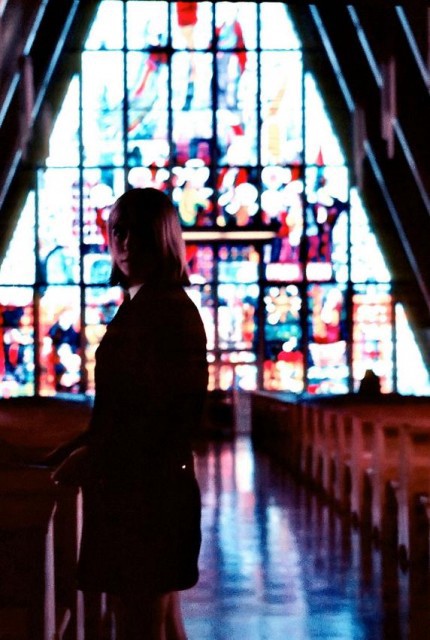Why Won’t the Catholic Church Ordain Women?
by Jo Piazza

Sometimes I imagine a Catholic Church where pedophile priests were rightfully punished and defrocked, rather than slapped on the hand and relocated; a Catholic Church where billions of dollars in investments and property were reallocated to help the poor; a Catholic Church where ego was replaced by open and honest communication.
It’s even harder, sometimes, to imagine a Catholic Church that gives women the respect and leadership positions they deserve. Women’s ordination in the Catholic Church was one of the few feminist movements to emerge from the ’70s that hit a complete and total stalemate. It is the most radical and ignored issue in the institution right now.
In the months leading up to Christmas in 1974, a progressive Catholic feminist named Mary Lynch sent out, instead of seasonal greetings, a note asking her acquaintances if they thought it was time that the Church allowed women to be priests. 31 of the women and one of the men responded yes.
The next year Lynch organized the first Women’s Ordination Conference in Detroit to examine the issue. She expected a few hundred participants at best and got more than 2,000.
In the process of writing my book If Nuns Ruled the World, I met Sister Maureen Fiedler, now the host of the public radio program Interfaith Voices. In 1979 she helped to organize the “Stand Up For Women” demonstration at Pope John Paul II’s first papal visit to the United States, in which 53 Catholic sisters wore blue armbands and refused to sit down while the pope spoke.
Wearing a brown suit and a jaunty checkered blouse, Sister Theresa Kane addressed the Pope. “I urge you, Your Holiness, to respond to the voices coming from the women of this country who are desirous of serving in and with the church as fully participating members,” Kane said.
35 years have passed and little has changed.
Pope Francis, still shiny and new in the Vatican, has been hailed as a potential reformer, superstar and progressive icon since he was elected to the position by a conclave of men last year. And yet, on the subject of women he has held fast to the Church’s institutional antiquated stance — women can’t be priests.
“The reservation of the priesthood to males, as a sign of Christ the spouse who gives himself in the Eucharist, is not a question open to discussion,” he said in his first apostolic exhortation in November 2013. He added that he wanted women to use their “feminine genius” to contribute to the church in other ways.
God forbid that women use their feminine genius to actually lead in an institution that has been plagued by decades of public relations crises, mainly perpetuated by male leaders who have used their masculine genius in shameful ways.
Today, on Women’s Equality Day, it’s worth noting that the Catholic Church lags far behind the world’s major religions when it comes to equality between men and women.
In 1972, the Jewish Reform movement ordained Sally J. Priesand as America’s first female rabbi. In 1974, the “Philadelphia Eleven” caused a firestorm within the Episcopal Church when eleven female deacons presented themselves to three male bishops to be ordained as priests.
The Church of England has allowed women to become priests for 20 years, and around one-third of Anglican clerics are women. In June, the Anglican Church voted to allow women to finally become bishops: this from a faith that broke from the Catholic Church so that a monarch might be allowed to divorce his wife.
The Bible tells us that Christ surrounded himself with strong and opinionated women. The first person that Jesus encountered when he rose from the dead was none other than Mary Magdalene. Only then did she tell the men about it.
“The problem is that those Gospels are written in a way that doesn’t give women enough credit,” Sister Maureen told me. “I actually think that in the early Church — and by that I mean the first century or two — women were close to being equals of men. I think it is one of the suppressed realities in Church history.”
I asked Sister Donna Quinn, an ardent feminist activist and crusader for women’s reproductive rights who has volunteered as an escort at an Illinois abortion clinic, what she thought about the new pope.
“How many women were on the ballot? How many women voted for this pope or ever vote for the leadership in the Church?” Sister Donna asked. She’s since started a campaign of burning pink smoke around the country to underscore the point that women had been left out of the conclave.
“I don’t think most people understand the significance of the fact that women have no right to vote in the Catholic Church,” she added. “The Church has put us down and tried to keep us down, and it’s one of the biggest institutions in the world.”
Much has been made of Pope Francis’s savvy about the contemporary world. He takes selfies. He’s on Twitter. He must realize that the Church does itself a great disservice in keeping women out of positions of power.
It’s time, I think, that we reminded him that “feminine genius” won’t cut it. If you’re on Twitter, wish him a happy Women’s Equality Day: you can find him @Pontifex.
Jo Piazza is a regular contributor to the Wall Street Journal, and her work has also appeared in The New York Times, New York Magazine, Glamour, Gotham, the Daily Beast, and Slate. Her book If Nuns Ruled the World: Ten Sisters On A Mission comes out on September 2nd.
Photo via David Stephenson/Flickr